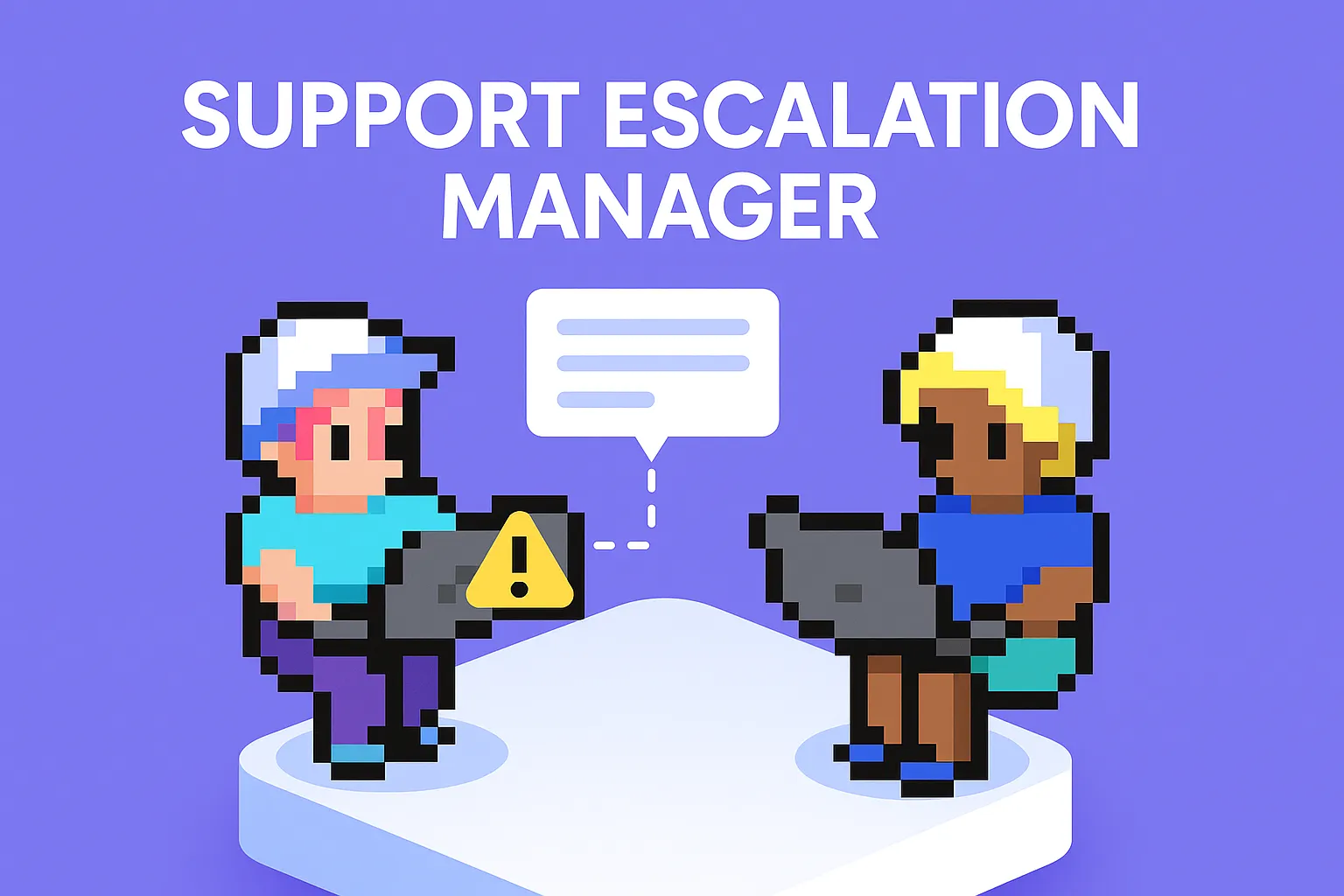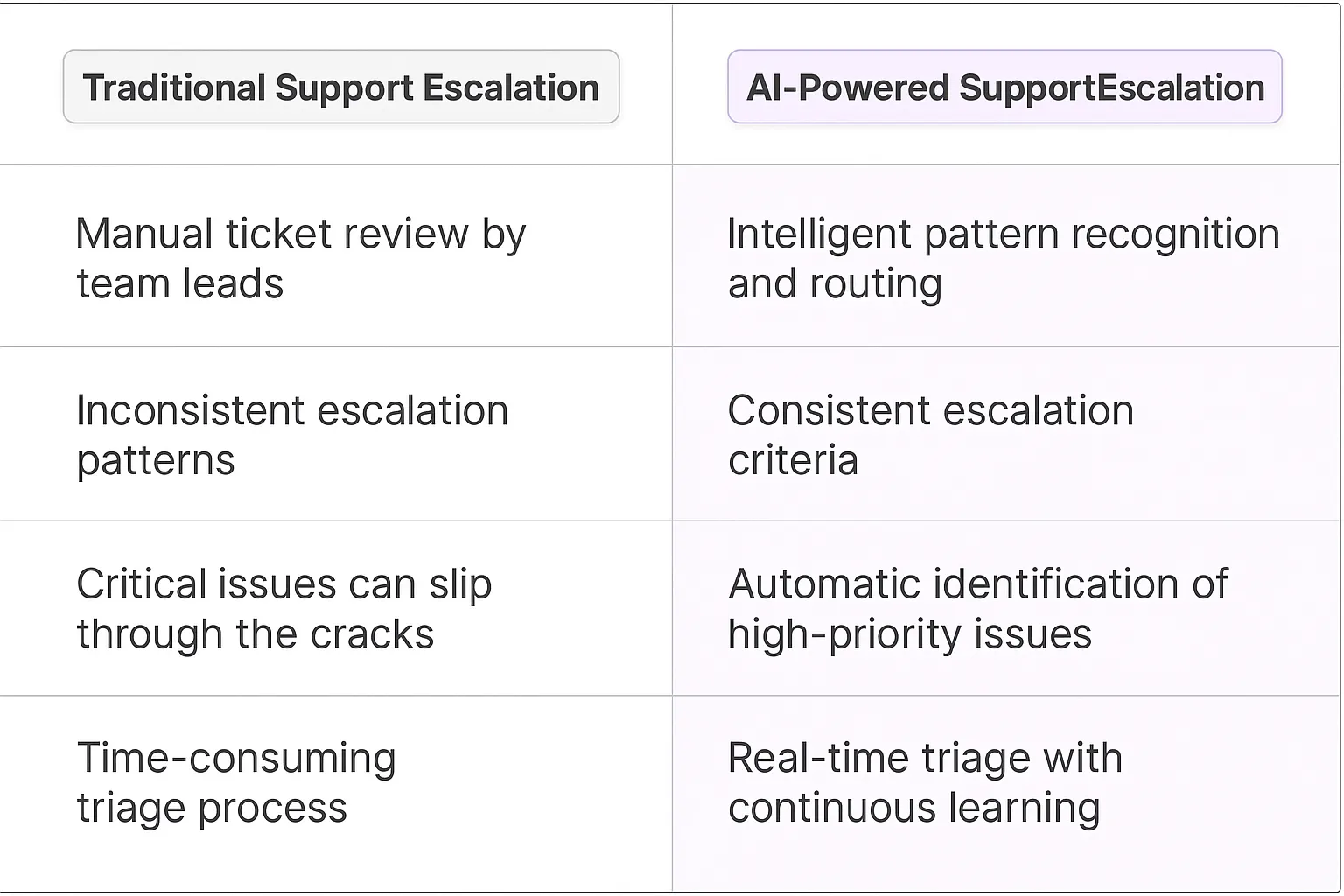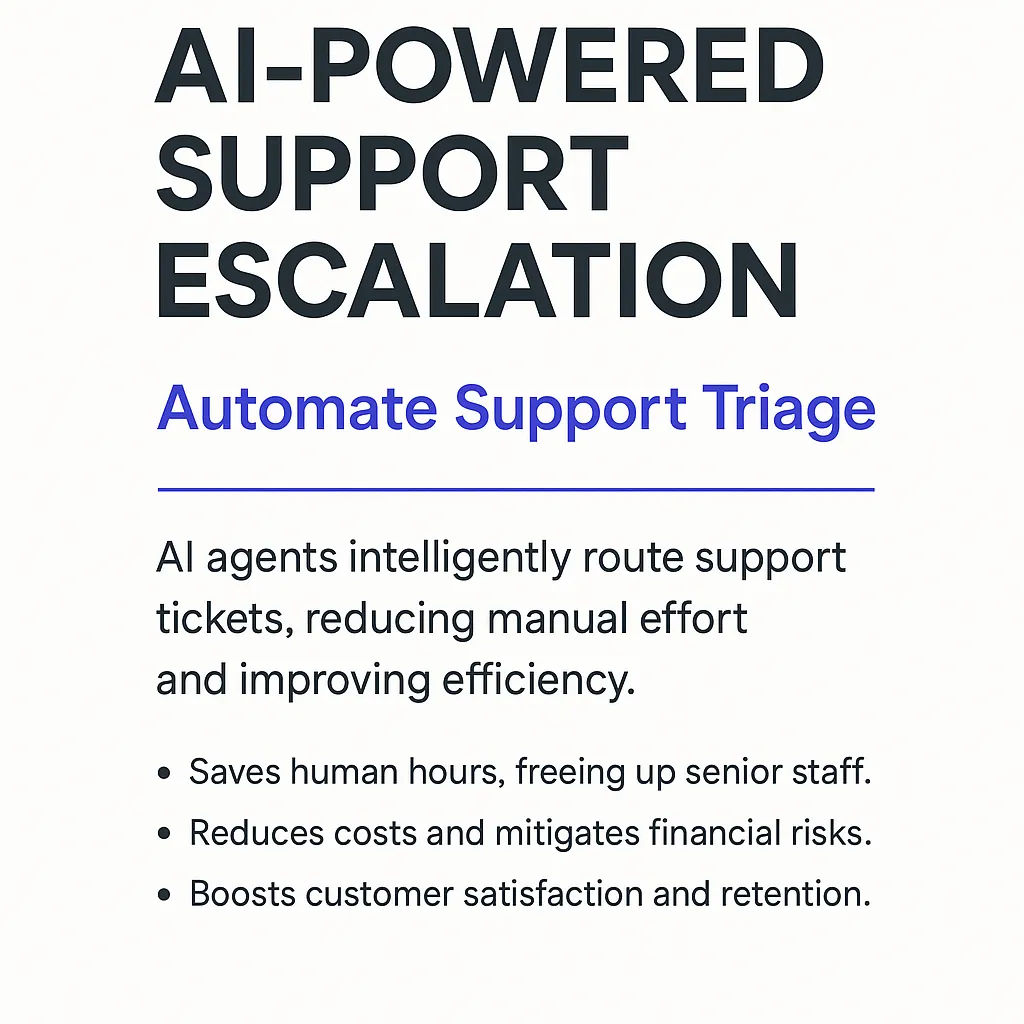Support Escalation Manager is an AI-powered system that transforms traditional support operations through intelligent ticket routing, priority assessment, and escalation management. Unlike conventional ticketing systems, it learns from every interaction to build a sophisticated understanding of which issues need escalation and how to route them most effectively. The system acts as a digital teammate that works alongside human support staff, handling the complex task of triaging and escalating support issues while preserving human judgment for critical decisions.

Support escalation traditionally relied on manual triage by team leads and managers who spent countless hours reviewing tickets, determining severity, and routing issues to the right specialists. This created bottlenecks where critical issues could slip through the cracks while support teams got buried in low-priority tickets. The old approach meant building complex decision trees and documentation that quickly became outdated, leading to inconsistent escalation patterns across teams.
Digital teammates transform support escalation through pattern recognition and intelligent routing that human managers simply can't match at scale. They analyze historical ticket data to understand which issues typically require escalation and automatically identify high-priority problems based on factors like customer tier, issue type, and business impact.
The real game-changer is how AI agents learn from every interaction. When a senior support engineer handles a complex database issue, the AI observes the resolution path and applies that learning to future similar cases. This creates a continuously improving knowledge network that gets smarter with each ticket.
Beyond just routing, these AI agents provide rich context to human teammates. They surface relevant past incidents, documentation, and tribal knowledge that helps engineers resolve issues faster. This institutional memory becomes especially valuable during critical outages when every minute counts.
For support leaders, AI agents deliver unprecedented visibility into escalation patterns and team performance. They can identify bottlenecks, suggest process improvements, and ensure consistent handling of issues across global support operations. The result is dramatically reduced mean time to resolution and higher customer satisfaction scores.
Most importantly, AI agents free up senior engineers and managers to focus on strategic work instead of spending their days triaging tickets. The technology handles the heavy lifting of initial assessment while preserving human judgment for truly complex decisions that require experience and intuition.

Support escalation is fundamentally a network effects business. Each interaction creates data that makes the entire system smarter. When you deploy an AI-powered escalation manager, you're not just solving individual tickets - you're building an institutional knowledge base that compounds over time.
The most successful support teams I've worked with treat their escalation system as a product. They obsess over the feedback loops: How quickly are issues being resolved? Where are the bottlenecks? Which engineers are most effective with which types of problems? An AI layer turns these questions into actionable insights.
But the real magic happens at scale. As your support volume grows, traditional escalation processes break down linearly. AI-powered systems get better with scale - they learn from every interaction, refine their routing logic, and surface patterns humans might miss. This creates a powerful growth loop where increased usage leads to better performance.
The teams winning at support automation aren't just throwing AI at the problem - they're thoughtfully designing their processes to take advantage of AI's strengths while keeping humans in the loop for high-judgment calls. This hybrid approach is what separates the good from the great.

Support escalation management AI agents are transforming how organizations handle complex customer issues across multiple sectors. These digital teammates excel at identifying critical support patterns, managing escalation workflows, and ensuring time-sensitive issues receive proper attention. The real power comes from their ability to learn from historical escalation data while adapting to new support scenarios in real-time.
When analyzing thousands of support tickets daily, these AI agents detect subtle patterns that human teams might miss. They can spot emerging issues before they become widespread problems, route escalations to the right subject matter experts, and maintain clear communication channels between support tiers. This intelligence creates a more responsive and efficient support ecosystem.
The impact is particularly noticeable in organizations dealing with high-stakes support scenarios where rapid response times directly affect business outcomes. From healthcare providers managing patient care escalations to financial institutions handling fraud alerts, these AI agents serve as vigilant partners in maintaining service quality and response effectiveness.
The most successful e-commerce companies I've worked with share a common trait - they've mastered the art of support escalation. Let me break down how Support Escalation Manager AI Agents transform customer service in online retail.
Take a high-growth D2C fashion brand handling 50,000+ customer interactions monthly. Their support team was drowning in tickets, and critical issues about damaged luxury items were getting lost in the noise. The Support Escalation Manager AI Agent analyzes incoming tickets in real-time, using natural language processing to detect urgency signals like "damaged item," "wrong size," and "missing order."
The AI Agent's pattern recognition capabilities go deeper than traditional rule-based systems. It identifies subtle indicators of customer frustration through sentiment analysis and contextual understanding. When a VIP customer reports a damaged $2,000 handbag, the AI immediately flags it as high-priority, routes it to senior support staff, and triggers automated updates to the logistics and quality control teams.
What's fascinating is how the AI Agent learns and adapts. It tracks escalation outcomes and customer satisfaction scores to continuously refine its prioritization model. After three months of deployment, the fashion brand saw their average resolution time for critical issues drop from 24 hours to 3 hours, while maintaining high-quality responses.
The most compelling aspect is the ripple effect on the entire support ecosystem. Support teams report feeling less stressed and more empowered, knowing they're focusing on the right issues at the right time. Customer satisfaction scores for high-value transactions increased by 42%, and repeat purchase rates showed a notable uptick.
This isn't just about sorting tickets - it's about creating a support infrastructure that scales intelligently with business growth while preserving the human touch for moments that matter most.
I've spent time analyzing how leading healthcare networks handle their support operations, and the transformation happening through AI-powered escalation management is remarkable. Let me share a specific case that demonstrates the impact.
A regional healthcare network managing 12 hospitals was struggling with their patient support center, handling over 100,000 monthly inquiries. Critical patient follow-ups and urgent care requests were getting buried under routine appointment scheduling and billing questions. Their Support Escalation Manager AI Agent changed the game by introducing intelligent triage.
The AI Agent processes incoming patient communications across multiple channels - phone transcripts, patient portal messages, and email. It identifies critical keywords and patterns indicating urgent medical needs, post-operative complications, or adverse medication reactions. What's particularly impressive is its ability to correlate patient history with current symptoms, creating a more nuanced urgency assessment.
When a post-surgery patient messages about increasing pain and fever, the AI Agent immediately recognizes potential complications. It elevates the case priority, routes it to the appropriate surgical care team, and initiates a rapid response protocol. The system even factors in variables like the patient's age, existing conditions, and time since surgery.
The learning curve has been fascinating to watch. The AI Agent continuously refines its escalation criteria based on medical outcomes and physician feedback. Six months into implementation, the network reported an 87% reduction in critical care delays and a 64% improvement in patient satisfaction for urgent care coordination.
The most significant impact? The reduction in preventable complications due to delayed responses. The nursing staff reports better work satisfaction, knowing urgent patient needs receive immediate attention. This isn't just moving tickets around - it's about creating a more responsive healthcare system that could literally save lives.
Building an effective Support Escalation Manager AI agent requires navigating several complex technical hurdles. The agent needs sophisticated natural language processing to accurately interpret customer issues and determine severity levels - misclassification can lead to critical problems being deprioritized or minor issues consuming senior support resources unnecessarily.
Integration with existing support systems presents another significant challenge. The agent must seamlessly connect with ticketing systems, knowledge bases, and communication platforms while maintaining data consistency. Many organizations use legacy systems that weren't designed for AI integration, requiring custom middleware solutions.
Support staff often develop specific escalation workflows over years of operation. Introducing an AI agent requires carefully mapping these established processes while identifying opportunities for improvement. The transition period demands extra attention as teams adapt to working alongside their digital teammate.
Setting appropriate escalation thresholds is crucial yet complex. Too sensitive, and the agent overwhelms senior support staff with unnecessary escalations. Too conservative, and critical issues might not receive timely attention. This calibration requires ongoing monitoring and adjustment based on real-world performance data.
Support staff may initially resist working with an AI agent, fearing job displacement or loss of autonomy. Clear communication about the agent's role as an enhancer rather than a replacement helps address these concerns. Training programs should emphasize how the agent augments human capabilities rather than diminishes them.
Customer trust presents another crucial consideration. Some customers may feel frustrated if they perceive their issue is being handled by an AI rather than a human. Transparent communication about the agent's role and maintaining human oversight for sensitive situations helps maintain customer confidence.
Support conversations often contain sensitive customer data, requiring robust security measures and compliance with regulations like GDPR or HIPAA. The AI agent must be designed with privacy-preserving features, secure data handling, and appropriate access controls. Regular security audits and updates are essential to maintain protection against emerging threats.
The evolution of support escalation through AI agents marks a fundamental shift in how organizations handle complex support operations. These digital teammates don't just automate existing processes - they create entirely new capabilities for understanding, routing, and resolving support issues. The network effects of continuous learning mean that early adopters gain compounding advantages as their systems become increasingly sophisticated.
Organizations that successfully implement AI-powered support escalation find themselves with more than just improved metrics - they discover new insights about their customers, products, and operations. The future of support isn't about replacing human judgment but augmenting it with AI capabilities that make the entire system more effective. Those who master this hybrid approach will set new standards for customer support excellence.